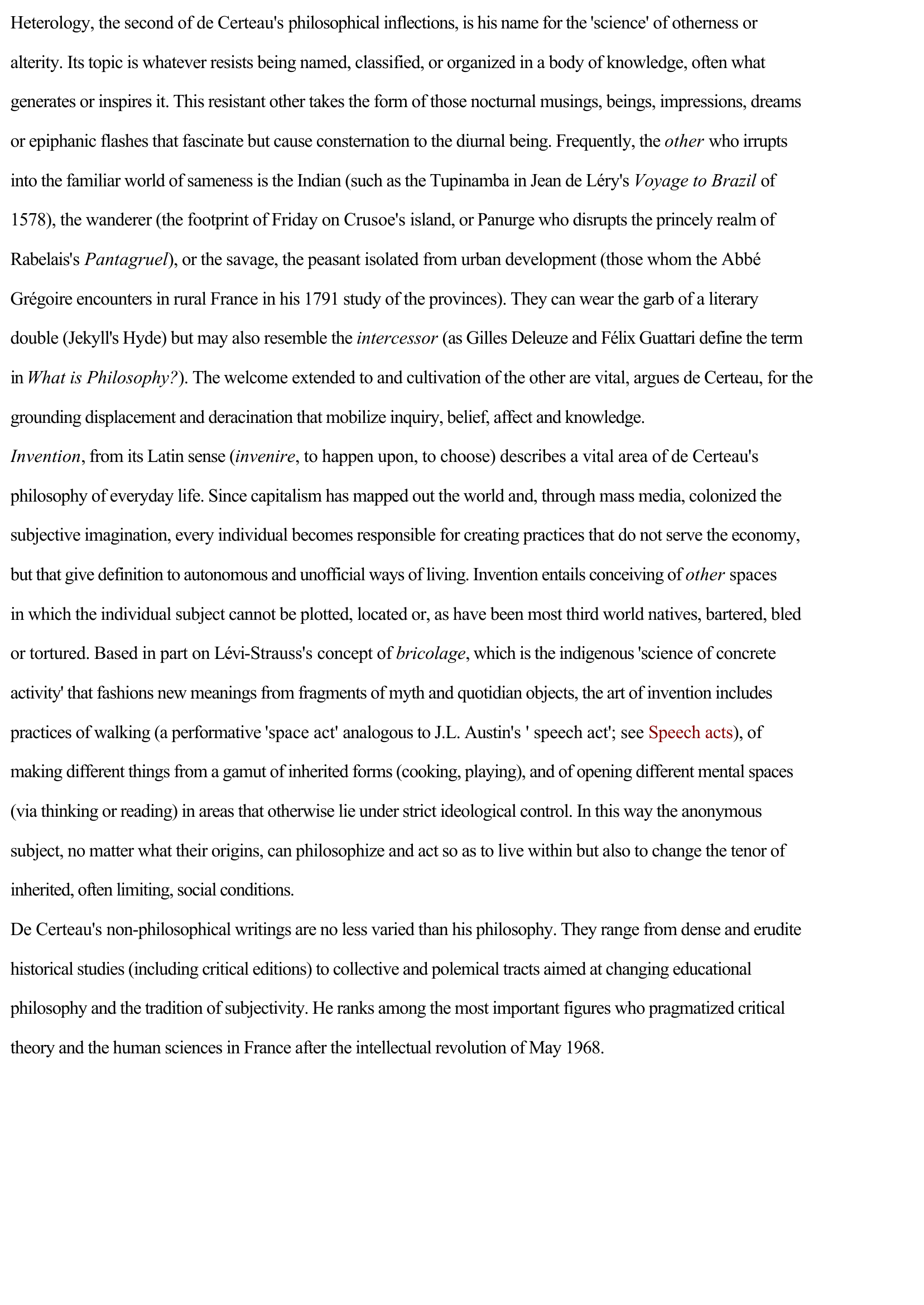Certeau, Michel de
Publié le 22/02/2012
Extrait du document
«
Heterology, the second of de Certeau's philosophical inflections, is his name for the 'science' of otherness or
alterity.
Its topic is whatever resists being named, classified, or organized in a body of knowledge, often what
generates or inspires it.
This resistant other takes the form of those nocturnal musings, beings, impressions, dreams
or epiphanic flashes that fascinate but cause consternation to the diurnal being.
Frequently, the other who irrupts
into the familiar world of sameness is the Indian (such as the Tupinamba in Jean de Léry's Voyage to Brazil of
1578), the wanderer (the footprint of Friday on Crusoe's island, or Panurge who disrupts the princely realm of
Rabelais 's Pantagruel ), or the savage, the peasant isolated from urban development (those whom the Abbé
Grégoire encounters in rural France in his 1791 study of the provinces).
They can wear the garb of a literary
double ( Jekyll's Hyde) but may also resemble the intercessor (as Gilles Deleuze and Félix Guattari define the term
in What is Philosophy? ).
The welcome extended to and cultivation of the other are vital, argues de Certeau, for the
grounding displacement and deracination that mobilize inquiry, belief, affect and knowledge.
Invention , from its Latin sense ( invenire , to happen upon, to choose) describes a vital area of de Certeau's
philosophy of everyday life.
Since capitalism has mapped out the world and, through mass media, colonized the
subjective imagination, every individual becomes responsible for creating practices that do not serve the economy,
but that give definition to autonomous and unofficial ways of living.
Invention entails conceiving of other spaces
in which the individual subject cannot be plotted, located or, as have been most third world natives, bartered, bled
or tortured.
Based in part on Lévi -Strauss 's concept of bricolage , which is the indigenous 'science of concrete
activity' that fashions new meanings from fragments of myth and quotidian objects, the art of invention includes
practices of walking (a performative 'space act' analogous to J.L.
Austin 's ' speech act'; see Speech acts ), of
making different things from a gamut of inherited forms (cooking, playing), and of opening different mental spaces
(via thinking or reading) in areas that otherwise lie under strict ideological control.
In this way the anonymous
subject, no matter what their origins, can philosophize and act so as to live within but also to change the tenor of
inherited, often limiting, social conditions.
De Certeau's non-philosophical writings are no less varied than his philosophy.
They range from dense and erudite
historical studies (including critical editions) to collective and polemical tracts aimed at changing educational
philosophy and the tradition of subjectivity.
He ranks among the most important figures who pragmatized critical
theory and the human sciences in France after the intellectual revolution of May 1968..
»
↓↓↓ APERÇU DU DOCUMENT ↓↓↓
Liens utiles
- Certeau, Michel de - anthropologie.
- Certeau, Michel de - religion.
- Certeau (Michel de), 1925-1986, né à Chambéry (Savoie), historien et philosophe français.
- CERTEAU (Michel de)
- MICHEL DE CERTEAU : L'ECRITURE DE L'HISTOIRE (Résumé & Analyse)

































